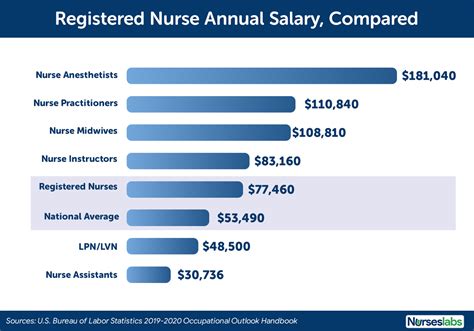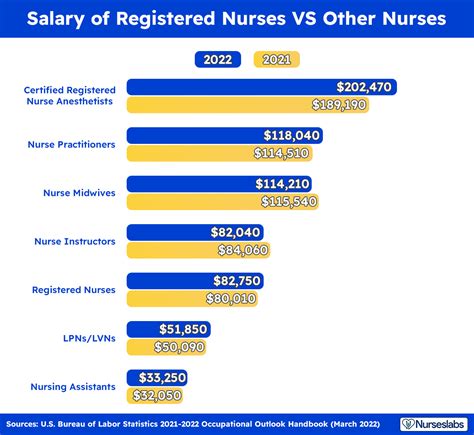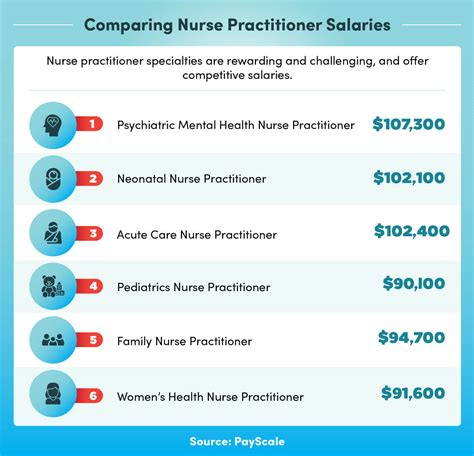Welcome to our in-depth exploration of nurse salary trends, where we unravel the intricate pay structures reflecting the dedication and expertise of these healthcare heroes. Whether you’re a seasoned nurse, considering a career in nursing, or simply curious about the financial aspects of this noble profession, this post offers valuable insights. We’ll delve into the elements that shape Registered Nurse (RN) pay rates, provide a comprehensive overview of Nurse Practitioner (NP) salaries, and spotlight the earning potential for Certified Registered Nurse Anesthetists (CRNAs). Additionally, we’ll share tips on how CRNAs can maximize their earnings and compare the salary trajectories across these nursing specializations. Join us as we dissect the factors at play in the world of nursing compensation and what it means for practitioners at every level within the healthcare industry.Explore the varying salary scales of nurses, from RNs to CRNAs, key factors affecting pay, and tips to boost earnings in the nursing field.
Understanding Nurse Salary Structures

When delving into the complex world of healthcare compensation, the structure of nurse salary can be intricate and multi-faceted, taking into account a myriad of factors that influence the earning potential of nursing professionals. Understanding how these salaries are determined is key for those entering the field as well as for seasoned nurses aiming to navigate their career trajectories. For instance, a pay rate for registered nurse (RN) is often delineated by a combination of educational background, clinical experience, specialized skills, and the healthcare setting in which they work.
Moreover, as the healthcare sector evolves, advanced practice roles such as nurse practitioners and certified registered nurse anesthetists (CRNA) have emerged with their distinct pay scales. A nurse practitioner salary might reflect their advanced education and expanded scope of practice, often commanding higher wages than their RN counterparts. Similarly, a CRNA salary is typically at the higher end of the spectrum, recognizing the specialized skills and high level of responsibility assumed in administering anesthesia. Thus, salary structures within nursing are tiered and complex, reflecting the diversity and specialization within the profession.
Factors Influencing Registered Nurse Pay Rates

When considering the complexities of nurse salary structures, it becomes evident that a myriad of factors contributes to the pay rate for registered nurses. Factors such as geographical location, level of experience, and educational background play a pivotal role in the financial compensation of these healthcare professionals. For instance, registered nurses operating in metropolitan areas with a higher cost of living may receive salaries that reflect the elevated expenses associated with those regions. Similarly, nurses with specialized skills or advanced certifications are likely to command a higher pay rate compared to their peers.
In addition to these elements, the healthcare facility’s setting can also influence a nurse’s earnings. Nurses employed in high-demand specialties or critical care units may observe an uptick in their compensation packages, as their roles require additional expertise and often, a greater assumption of risk. Furthermore, union representation and collective bargaining agreements can have a significant impact on a nurse’s salary, establishing minimum pay scales and advocating for regular wage increases. Ultimately, understanding the variables that affect nurse salary is essential for both current and aspiring nurses aiming to navigate their career paths strategically.
Nurse Practitioner Salary Overview

Within the healthcare industry, the nurse practitioner salary reflects the advanced level of education and responsibility these professionals hold. Nurse practitioners (NPs) are among the higher earning nursing positions, often outpacing the pay rate for registered nurses due to their expanded scope of practice, which includes diagnosing and managing patient care independently or alongside other healthcare providers. The compensation for NPs varies widely based on geographic location, experience, specialty area, and the type of healthcare facility in which they work.
When examining the scale of nursing salaries, it is clear that the specialized training and certifications a nurse undertakes can significantly influence their income trajectory. For instance, a certified registered nurse anesthetist (CRNA) salary is typically at the higher end of the spectrum, reflecting the rigorous nature of their work and the critical role they play in surgical settings. Meanwhile, nurse practitioners balance a blend of advanced clinical training with patient-centered care, which justifies their lucrative nurse practitioner salary within the medical community. Understanding these nuances is essential for any nurse or healthcare professional looking to navigate the complexities of nursing compensation.
CRNA Salary: Entry-Level Expectations
Embarking on a career as a Certified Registered Nurse Anesthetist (CRNA) brings with it high expectations, not least of which is the potential for a substantial earning capacity. The CRNA salary at the entry-level may vary widely based on geographic location, healthcare facilities, and the individual’s educational background; however, it is typically seen that the investment in specialized education and training yields a commensurate return in terms of compensation. This specialized cadre of nursing professionals can anticipate compensation packages that reflect the critical nature and high level of expertise required for their role within the medical team.
Understanding the entry-level CRNA salary is an exercise in appreciating the intricacies of advanced nursing pay structures. This role requires extensive knowledge and precision, resulting in a pay rate that mirrors the level of sophistication and responsibility inherent to the job. Although the initial compensation for a CRNA may be influenced by various factors such as the employer’s pay scale, regional cost of living, and demand for anesthesia services, new CRNAs can still expect to enter the workforce with one of the highest salary foundations in the nursing field, indicating that the effort put into obtaining their certification is well-realized in their pay rate.
Maximizing Earnings as a Certified Registered Nurse Anesthetist

As healthcare demands rise, the role of a Certified Registered Nurse Anesthetist (CRNA) is increasingly pivotal, and understanding the ways to maximize earnings within this high-stakes field has never been more important. The salary of a CRNA is reflective of the extensive education, high level of responsibility, and expertise required to administer anesthesia safely and effectively. CRNA positions, known for commanding high incomes, offer various avenues for professionals to further increase their earning potential.
The CRNA salary is significantly influenced by factors such as geographic location, years of experience, complexity of the cases handled, and the type of healthcare facility in which a CRNA is employed. For instance, CRNAs working in urban areas where the cost of living is higher may earn a larger nurse practitioner salary compared to those in rural settings. To maximize earnings, CRNAs may also pursue additional certifications in specialized areas of anesthesiology, thereby enhancing their marketability and capacity to negotiate higher pay rates. Furthermore, CRNAs who are willing to take on overtime or be on-call can often boost their overall compensation through shift differentials and on-call stipends, reflecting the added commitments beyond regular work hours.
Comparing RN, NP, and CRNA Salaries in Healthcare
When discussing compensation within the healthcare sector, there is a clear variance in earnings among nurse roles, notably between Registered Nurses (RNs), Nurse Practitioners (NPs), and Certified Registered Nurse Anesthetists (CRNAs). Scrutinizing these disparities, we must consider specialized training, scope of practice, and regional factors that fundamentally impact the nurse salary scales. An example of such differentiation is evident when we compare the pay rate for registered nurse positions to those held by NPs; typically, NPs command a higher nurse practitioner salary due to their advanced education and expanded practice capabilities, which include diagnosing conditions and prescribing medication.
Focusing specifically on CRNA salary, the remuneration package often eclipses both RN and NP pay due to the highly specialized nature of anesthesia practice and critical care responsibilities that CRNAs hold. As they provide pivotal anesthesia services across various surgical settings, CRNAs are among the highest earners in nursing, with their salary reflecting the intensified level of expertise and autonomy inherent in their role. Comparatively, while RNs may engage in a broad scope of general nursing duties, impacting their pay rates, CRNAs and NPs are serving in capacities with heightened levels of clinical judgment and decision-making, which is directly mirrored in their respective compensation structures.
Frequently Asked Questions
What are the current salary trends for Nurse Practitioners?
Nurse Practitioners (NPs) are experiencing a positive salary trend, with average annual wages increasing due to the rising demand for healthcare services and the expanded role of NPs in providing primary care.
How has the demand for Certified Registered Nurse Anesthetists (CRNAs) affected their pay rates?
As the demand for CRNAs has grown, particularly because they can provide anesthesia at a lower cost than physicians, their pay rates have seen a significant upward trend, making them some of the highest-paid nursing professionals.
Are Registered Nurses (RNs) seeing any changes in their salaries?
Registered Nurses are also noticing a gradual increase in their salaries, influenced by factors such as educational level, years of experience, and regional healthcare needs. However, salary growth can vary depending on the workplace setting and geographical location.
What factors are contributing to the changes in nurse salaries?
Several factors contribute to the changes in nurse salaries, including a growing patient population, an aging workforce, the need for specialized nursing skills, and the impact of healthcare legislation.
Is there a difference in salary trends between urban and rural areas?
Yes, salary trends for nurses can vary significantly between urban and rural areas. Urban areas often offer higher salaries due to the higher cost of living and greater demand for healthcare services, whereas rural areas may offer lower salaries but sometimes provide additional incentives to attract nursing professionals.
How does the level of education affect a nurse’s salary?
Generally, higher levels of education in nursing are associated with higher salaries. Nurses with advanced degrees such as a Master of Science in Nursing (MSN) or a Doctor of Nursing Practice (DNP) tend to earn more than those with an Associate Degree in Nursing (ADN) or a Bachelor of Science in Nursing (BSN).
What is the job outlook for nurses in the coming years?
The job outlook for all categories of nurses is very promising. The Bureau of Labor Statistics predicts a higher-than-average job growth rate for nursing professions in the coming years, reflecting the ongoing need for healthcare services and the increased emphasis on preventive care.







